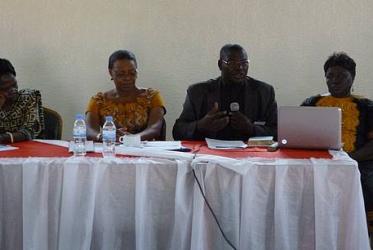Displaying 241 - 260 of 339
Preventing violence and HIV pandemic in Nigeria
19 April 2012
WCC issues statement on human trafficking in Sinai desert
24 February 2012
Churches are called to be peacemakers in Africa
03 February 2012
African churches address peace and security issues
31 January 2012
Durban outcome is not enough, says WCC
13 December 2011
Religious voices advocate for climate justice at Durban
28 November 2011
Before Durban climate talks, Brazilian ecumenists think about Rio+20
23 November 2011
WCC expresses concern over human trafficking in Sinai Desert
18 November 2011
Human rights advocacy is a prophetic witness of the churches
01 November 2011
Raising ethical dimensions in debate on climate justice
22 September 2011
WCC general secretary: Peace and justice gain momentum
14 September 2011
Finding the strength to pursue a just peace
21 May 2011












